You can’t close deals you don’t catch.
By the time someone notices a missed call and gets back to a prospect, they may have already signed with a competitor. A single lost connection can cost six figures in lifetime value, and it’s rarely the only one.
The issue usually isn’t the team. It’s the workflow.
Voicemails get buried, call routing lags, and no one has time to monitor the phone. What’s needed isn’t another “inbox,” but a system that can answer calls, qualify interest, and book meetings automatically.
That’s where AI answering tools come in. Unlike static phone trees or outsourced receptionists, these solutions sound natural, act like coordinators, and integrate directly with existing systems. For businesses that depend on inbound intent, they aren’t just convenient, they’re essential.
Shortlist: Top 3 AI Answering Picks
1. Rosie AI – Best for Human-Sounding AI That Gets the Job Done
- Realistic voice, not robotic
- Books meetings directly
- Seamless CRM/calendar integration
2. Ruby – Best for Firms Requiring Brand-Polished Live Reception
- U.S.-based live agents
- Custom call scripts
- Escalates sensitive calls
3. Conversica – Best for Sales Teams That Treat Every Call as a Deal Starter
- Inbound and outbound AI
- Persistent follow-up
- Built-in CRM automation
These are the tools that combine speed, intelligence, and customer context. Keep reading to learn how to choose and which ones are actually worth deploying.
How to Choose a Tool That Actually Keeps the Conversation Moving
1. A Voice That Doesn’t Trigger the “Is This a Bot?” Reflex
Callers make judgment calls in seconds, and if the voice sounds synthetic or off-tempo, you’ve already lost trust.
It’s not just about pronunciation. It’s about natural pacing, interruption handling, tone control, and dynamic logic.
Some AI tools collapse the moment a caller goes off-script or asks a layered question. Others, like Rosie AI, adapt in real time and deliver responses that pass for a trained human receptionist.
Before you choose any provider, listen to sample calls under pressure, complex questions, and multiple back-and-forth exchanges. The bar isn’t just clarity anymore. It’s believability.
2. It Should Book the Meeting, Not Just Take a Message
If your AI can’t close the loop on a call by scheduling a meeting, routing a support ticket, or logging intent into your CRM, you’re just building another backlog.
The goal isn’t to record more messages. It’s to reduce the need for callbacks.
Look for platforms that natively integrate with calendars (like Google or Outlook), CRMs (like HubSpot or Salesforce), and internal tools (like Slack or Zendesk). Bonus points for instant post-call alerts and summaries that show up where your team actually works.
Speed isn’t just about answering fast. It’s about acting without friction.
3. Know When to Let a Human Take the Wheel
Even the best AI systems encounter edge cases, such as billing disputes, legal escalations, and emotional support scenarios.
The smartest teams don’t try to automate those away. Instead, they design escalation logic and workflows that kick in when confidence drops or caller sentiment shifts.
Hybrid services like Ruby or AnswerConnect solve this by layering AI for intake and humans for follow-through.
If your business has high-value clients or regulated interactions, make sure the AI can escalate cleanly, hand off context, and notify your team instantly. A missed moment here isn’t just a service gap but a reputational risk.
4. If It Sleeps, You Lose Leads
Most people don’t call during your business hours. They call when they’re available. Nights, weekends, lunch breaks, or 7 a.m. before the school run.
If you’re not answering live (via AI or human), you’re losing to someone who is.
Many services claim 24/7 coverage, but dig deeper: are calls answered live or routed to voicemail queues after hours? Does the AI still have access to your scheduling and systems overnight? Especially for businesses with distributed customers or urgent needs (think HVAC, law, healthcare), round-the-clock availability isn’t a feature, it’s the floor.
5. Guardrails Matter When Data Is Sensitive
Healthcare practices, legal firms, and financial services providers don’t just need a helpful voice, they need documented security. If your answering tool isn’t HIPAA-, GDPR-, or PCI-compliant, it’s a liability.
Look for end-to-end encryption, access-controlled call logs, and clear audit trails. You should also be able to redact call transcripts and control how recordings are stored.
A strong AI receptionist doesn’t just sound competent. It protects the client’s trust and your business’s reputation. Compliance isn’t negotiable, and neither is the perception that your team handles sensitive info casually.
The 5 Best AI Answering Services in 2025 (Ranked by Real-World Utility)
1. Rosie AI – Best for Human-Sounding AI That Gets the Job Done
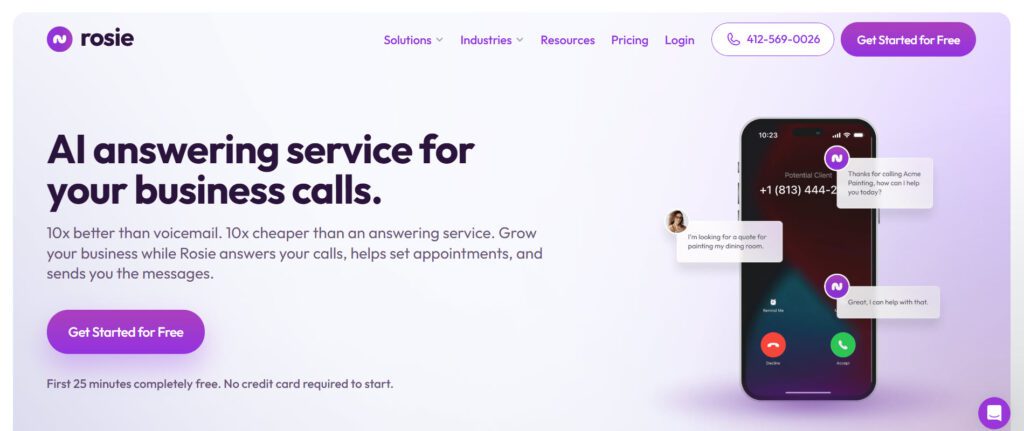
- Founded: 2024
- Headquarters: Remote
Rosie AI delivers the most natural-sounding AI voice on the market, and it’s not just a parlor trick. It handles full conversations, follows non-linear dialogue, and dynamically adjusts tone and cadence to match the caller. That realism translates directly into trust, especially on first-touch calls where tone matters as much as accuracy.
More than just voice quality, Rosie AI acts. It books meetings, captures caller context, and syncs instantly with platforms like Google Calendar, HubSpot, Salesforce, and Clio. All call activity is logged in real time, with automated summaries sent via email or Slack. It’s a true front-desk alternative that integrates cleanly into the way lean teams already operate.
Rosie AI is purpose-built for high-intent environments (agencies, firms, startups), where missing a call means missing revenue. And unlike heavier platforms, it’s intentionally lightweight and easy to deploy without IT overhead.
2. Ruby – Best for Firms Requiring Brand-Polished Live Reception
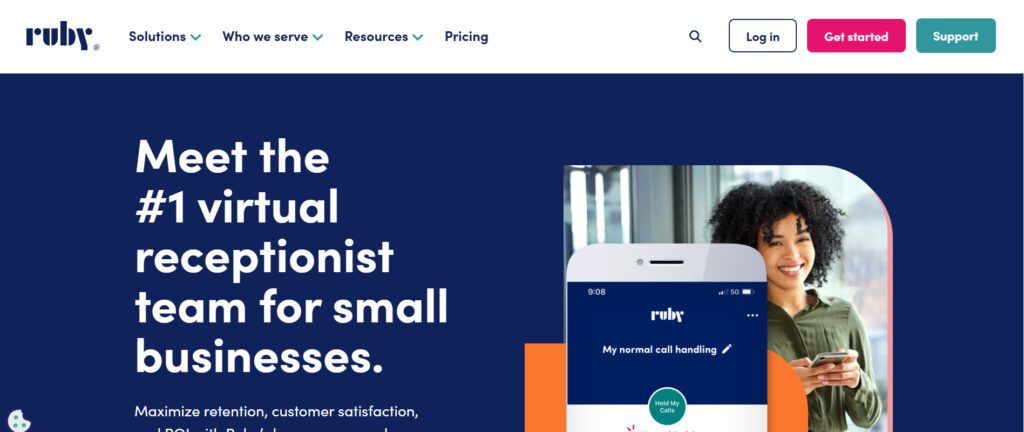
- Founded: 2003
- Headquarters: Portland, OR
Ruby combines the polish of a premium receptionist with just enough automation to keep workflows tight. Every call is answered by a live, U.S.-based agent trained to represent your brand, follow your scripts, and handle sensitive or high-context conversations with discretion. For firms in legal, consulting, or high-end services, Ruby creates a white-glove experience without adding headcount.
Its platform includes optional AI pre-screening and CRM integrations, but the human layer is where Ruby stands out. You get real-time call summaries, appointment booking, bilingual support, and full customization of call flows. This isn’t a fit for teams looking for pure AI, but if brand tone matters more than raw automation, Ruby delivers consistently professional results.
3. Conversica – Best for Sales Teams That Treat Every Call as a Deal Starter
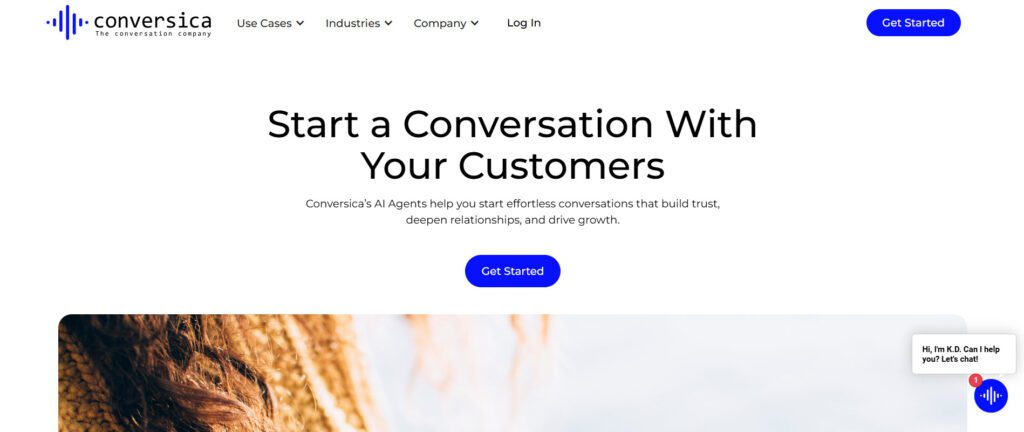
- Founded: 2007
- Headquarters: San Mateo, CA
Conversica isn’t built for basic reception. It’s designed to engage leads and drive pipeline. Its AI agents work across voice, email, and SMS, responding to inquiries, following up automatically, and scheduling meetings when prospects are ready to talk.
For sales teams managing high-volume lead flows. Think inbound demo requests, contact forms, or event signups. Conversica acts as a persistent, tireless SDR. It scores leads based on intent, continues outreach until contact is made, and only escalates when the lead is qualified. Full CRM integrations with Salesforce, HubSpot, and Marketo make sure nothing slips through the cracks.
This tool is ideal for companies that view every missed call as a missed deal and want AI that behaves like an active member of the sales team, not just an answering service.
4. Tidio – Best for E-Commerce Brands That Need Voice Support at Scale
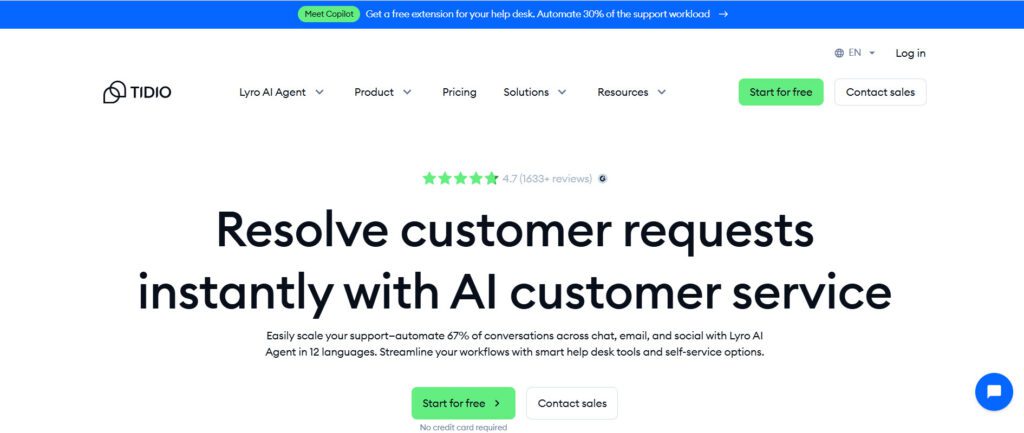
- Founded: 2013
- Headquarters: San Francisco, CA
Tidio started as a live chat tool for Shopify, and it shows. Its AI voice features are designed for online businesses dealing with support requests, order questions, or product inquiries across multiple channels.
Tidio’s AI can answer calls triggered by website interactions, route issues, and handle common e-commerce tasks like returns or order tracking. It mimics human agents well enough to maintain customer trust without overpromising complexity. Native integrations with Shopify, WooCommerce, and Messenger make setup quick and painless.
It’s not a full front-desk replacement but for DTC brands that want instant response without adding headcount, Tidio offers a clean, affordable bridge between automation and customer care.
5. Air AI – Best for After-Hours Lead Capture With Human-Like Fluency
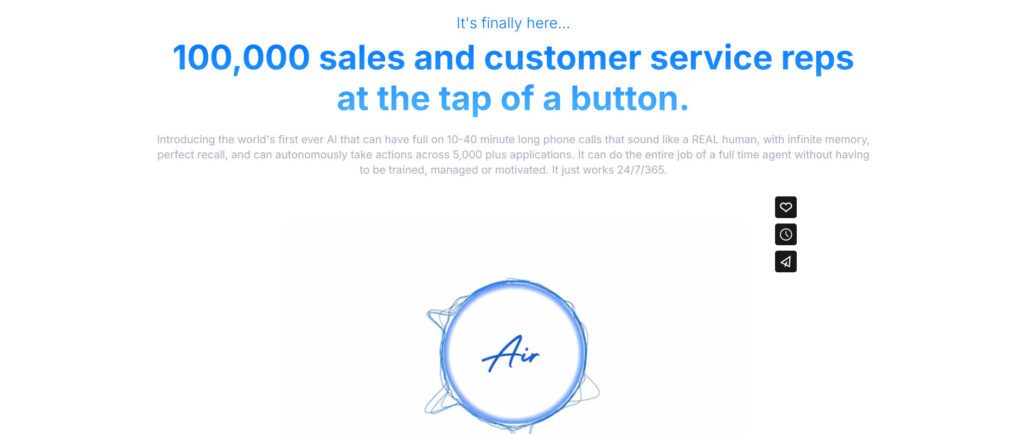
- Founded: 2023
- Headquarters: Miami, FL
Air AI stands out for its ability to carry natural, free-flowing conversations that sound indistinguishable from real human agents. It’s designed for businesses that can’t afford to miss a lead (day or night) but don’t want to staff a full-time support team.
The platform handles full inbound call workflows, from lead qualification to appointment booking, using deep conversational logic and real-time CRM syncing. Air AI also adapts tone and pacing to fit the caller, helping brands maintain professionalism even when no one’s in the office.
For high-intent industries (legal, real estate, services) where the first few minutes of a call can make or break the deal, Air AI offers 24/7 coverage without compromising on quality or personalization.
Every Missed Call Is a Missed Opportunity
AI answering tools aren’t just about speed or convenience, they’re about capturing intent while it’s still hot. Whether you’re in sales, services, or support, the difference between a live call and a missed one is often the difference between revenue and regret.
The right platform doesn’t just answer, it understands your workflows, syncs with your stack, and moves conversations forward without adding admin drag. Rosie AI stands out for its natural voice and native integration. Ruby brings a human touch to high-trust industries. Conversica, Tidio, and AnswerConnect each solve for specific use cases with real operational value.
Whatever you choose, the goal stays the same: no dropped calls, no dropped leads, no wasted time.

